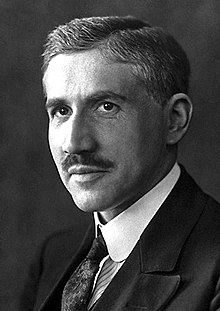Otto Fritz Meyerhof (German pronunciation: [ˈɔto ˈmaɪ̯ɐˌhoːf] ⓘ; 12 April 1884 – 6 October 1951) was a German physician and biochemist who won the 1922 Nobel Prize in Physiology and Medicine.[3][4]
Otto Fritz Meyerhof
| |
|---|---|
 | |
| Born | (1884-04-12)12 April 1884 |
| Died | 6 October 1951(1951-10-06) (aged 67)
Philadelphia, Pennsylvania, United States
|
| Nationality | German |
| Alma mater | University of Strasbourg University of Heidelberg University of Berlin |
| Known for | Relationship between the consumption of oxygen and the metabolismoflactic acid in the muscle |
| Awards | Nobel Prize in Physiology or Medicine, 1922[1] Fellow of the Royal Society[2] |
| Scientific career | |
| Fields | Physics and Biochemistry |
| Institutions | University of Kiel |
Otto Fritz Meyerhof was born in Hannover, at Theaterplatz 16A (now:Rathenaustrasse 16A),[5][6] the son of wealthy Jewish parents. In 1888, his family moved to Berlin, where Otto spent most of his childhood, and where he started his study of medicine. He continued these studies in Strasbourg and Heidelberg, from which he graduated in 1909, with a work titled "Contributions to the Psychological Theory of Mental Illness".
In Heidelberg, he met Hedwig Schallenberg. They married in 1914 and had three children together: a daughter, Bettina, and two sons, Gottfried (who after emigration used the anglicized name Geoffrey) and Walter.
In 1912, Otto Meyerhof moved to the University of Kiel, where he received a professorship in 1918. In 1922, he was awarded the Nobel Prize in Medicine, with Archibald Vivian Hill, for his work on muscle metabolism, including glycolysis.[7] In 1929, he became one of the directors of the Kaiser Wilhelm Institute for Medical Research in Heidelberg, a position he held until 1938, when Jews were expelled from university teaching positions.
To escape the increasing oppression of Jews by the Nazi regime, in 1938 Meyerhof emigrated with his family to Paris.[8] After the fall of France in 1940, they fled to Marseille. Aided by the Emergency Rescue Committee, they left the country by ship to the United States that year. Meyerhof was appointed to a guest professorship at the University of Pennsylvania in Philadelphia.
Meyerhof died in Philadelphia at the age of 67.[9] In addition to receiving the Nobel Prize, he was recognized for his contributions to the study of glycolysis, by the naming of the common series of reactions for the pathway in Eukaryotes as the Embden–Meyerhof–Parnas Pathway.[10]
Otto Fritz Meyerhof was born on April 12, 1884, in Hannover. He was the son of Felix Meyerhof, a merchant of that city and his wife Bettina May. Soon after his birth his family moved to Berlin, where he went to the Wilhelms Gymnasium (classical secondary school). Leaving school at the age of 14, he was attacked, at the age of 16, by kidney trouble and had to spend a long time in bed. During this period of enforced inactivity he was much influenced by his mother's constant companionship. He read much, wrote poetry, and went through a period of much artistic and mental development. After he had matriculated, he studied medicine at Freiburg, Berlin, Strasbourg, and Heidelberg.
Dr. Otto Meyerhof, co-winner of the 1923 Nobel Prize in Medicine, who had been a research professor in physiological chemistry at the University of Pennsylvania since coming to the United States from ...